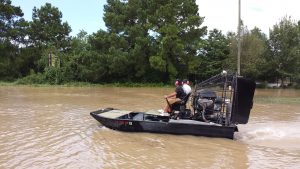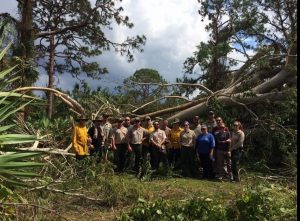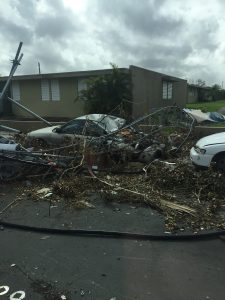Three major hurricanes, Harvey, Irma and Maria, hit the Carribbean and southern United States within a few weeks, causing loss of life, injuries and billions in damages. We spoke with several alumni in those areas who were affected, and what follows is an accounting of their experiences with the storms.
Hurricane Harvey H20: Yevgeniy Kondratenko ’03
“It’s pretty unnerving when you hear talk about the reservoir and see the name of your subdivision (on the news),” said Yevgeniy Kondratenko ’03, who lives in Houston near the Addicks Reservoir. For him, the unrelenting rainfall after Hurricane Harvey meant watching the water levels – on his street, on his  lawn and in the reservoir. For two nights, he and his wife took turns sleeping two hours at time to keep an eye on the water, planning their escape route if evacuation was necessary and determining what needed to be carried upstairs in case the water came into their home.
lawn and in the reservoir. For two nights, he and his wife took turns sleeping two hours at time to keep an eye on the water, planning their escape route if evacuation was necessary and determining what needed to be carried upstairs in case the water came into their home.
Kondratenko, who is a process engineer for BP America, figured out the elevation of both his house and the emergency spillway on the reservoir. Since his house’s elevation was above the spillway, that was enough to keep the water about five feet from his front door when it finally stopped raining. He estimated that if the water had risen just one more foot, they would have had water in their house. “I learned a lot more about that reservoir than I ever knew before,” he said with a laugh.
Several houses near him did take on water, and the street in his subdivision was only navigable by boat for about two weeks, but his family stayed dry and never lost electricity.
“We were stressed, but we felt very blessed.”
And, he said, it felt good to see that as soon as the water subsided, volunteers arrived to help Houston residents.
Kondratenko said he would be working from home for several months since BP’s office building flooded.
Irma beachfront cleanup: Brittany Bremer ’16 and Tony Bender ’82
Florida residents Brittany Bremer ’16 and Tony Bender ’82 endured Hurricane Irma on each coast, Bremer in Fort Myers on the Gulf of Mexico side and Bender in Indian Harbour Beach on the Atlantic side.
“About a week ahead of the hurricane, you started to see lines to get fuel and empty shelves that used to  hold water, canned goods and carpentry supplies,” Bremer said. “Most gas stations were starting to run out of fuel, as well.”
hold water, canned goods and carpentry supplies,” Bremer said. “Most gas stations were starting to run out of fuel, as well.”
Both Bremer and Bender live in mandatory evacuation zones, but decided to prepare their homes and ride out the storm there.
Bremer said she decided not to evacuate because she is a couple blocks away from an un-evacuated zone, her building is concrete and several neighbors were staying.
“My neighbors were kind enough to keep checking on me, and eventually I stayed in their apartment most of the time during the storm,” Bremer said. “There were a few times I was frightened, especially during the eye of the storm.”
Bender, who has been in Florida for a decade, lives about two blocks from the beach. He said his family had earlier thought about going to his brother’s in St. Petersburg, but then Irma seemed to be heading that way, so they stayed put.
“When you see those guys on the Weather Channel on your beach, it’s not good,” Bender said with a laugh.
Bremer, a native of St. Joseph and a park ranger at Delnor Wiggins Pass State Park in Naples, moved to Florida after earning her wildlife conservation management degree in 2016. This was her first hurricane experience.
She said she didn’t have any damage from Hurricane Irma to her apartment, but the beachfront state park received substantial damage.
The park was closed three weeks for cleanup, and employees from other parks were called in to help. Most of the damage was from downed trees and the storm surge, she said, and clean-up consisted of sawing down trees, wood chipping and digging out buried tables and grills. She also helped for a week at Koreshan State Park in Estero to help clear campsites so FEMA trailers could be moved in.
Bremer is working on her master’s in environmental studies at Florida Gulf Coast University in Fort Myers, and her classes were cancelled for a week after the hurricane, too.
Bender, a Cedar Falls, Iowa native and president of TNT Online Sales, said his family only lost electricity for about 24 hours, although a lot of neighbors were out for 10-14 days. He also said some solar panels on his house were damaged. And, of course, many trees were down all over the area.
“We love it here except when there’s a hurricane,” Bender said.
Hurricane Irma and the zoo: Dr. Mark Wilson ’80
The hyenas were not laughing; they hate the wind. So do jaguars. Monkeys, too – they’ll form a circle with their backs to it.
That, Dr. Mark Wilson ’80 said, is what to expect when a zoo is in the path of a hurricane, and that is what happened when Hurricane Irma hit the Florida International Teaching Zoo in Bushnell, about 60 miles from the Tampa area.
Dr. Wilson, a veterinarian at the zoo, said no animals were lost or hurt as a result of the hurricane, but a lot of preparation went into ensuring that outcome.
First, he said, they needed to make sure the zoo stocked up on four or five days of food post-hurricane. Preserving the meat for the carnivores required a generator for a refrigerator. Then, because running water is a must and wouldn’t be available if power was lost, they needed a generator for that, too, to ensure that the animals didn’t overheat and had clean water to drink. Then, Dr. Wilson said, they had to think about the humans who would be cleaning up after the hurricane – they needed a cool room to rest and eat. Yes, that meant another generator.
“We all work to make sure the animals are alright,” said Dr. Wilson, who has lived in Florida for about 30 years and been through 10 hurricanes. “You prepare for the worst and hope for the best. This was a scary one.”
He and the zoo’s general curator spent the night at the zoo when the Category 3 hurricane hit Sept. 10, one at each end in their cars, driving around throughout the night to check on the animals and facilities.
The zoo had a lot of downed trees and no power for nine days, so the generators were put to work.
“One thing that always gets me is the debris,” Dr. Wilson said. “You’re up to your shins in debris from the trees, and you’re never quite ready for that.”
Maria’s island devastation: Erick Bracero Serrano ’95
Erick Bracero Serrano ’95 said enduring Hurricane Maria’s 12 hours of driving rain and howling winds was the worst experience he’s ever had in his life.
 Bracero Serrrano, who lives in Gurabo, Puerto Rico, said for the past 30 years, hurricanes have bypassed the 3,500 square-mile island, but Maria was a Category 4 direct hit on Sept. 20.
Bracero Serrrano, who lives in Gurabo, Puerto Rico, said for the past 30 years, hurricanes have bypassed the 3,500 square-mile island, but Maria was a Category 4 direct hit on Sept. 20.
He said the hardest part for his wife, Michelle, and him was trying to stay calm so their three children wouldn’t be upset. “We had to keep a poker face even though we knew it was very dangerous.”
Hunkered down from about 3 a.m. to 3 p.m. in the master bedroom, the safest room in the house, they were worried about windows and doors breaking, and debris clogging their rain gutters.
Evacuation wasn’t an option. When Puerto Rico officials realized Maria was going to make landfall on the island, the airport closed.
“The island is so small and the hurricane was so big, there was no safe place to go on the island,” he said.
Following the storm, Bracero Serrano’s family was without power or water for about a month, but many homes were without power for much longer. The family had some broken windows and roof tiles, and a little water in the house, but he said they feel blessed.
One of the difficulties for several months was that there were no working stoplights throughout the island, so Bracero Serrano’s normal 40-minute commute to San Juan turned into up to an hour and a half with multiple four-way stops.
He said when his business, Reality Realty PSC, got power back two weeks after the hurricane, the company offered shelter for employees’ families, so Bracero Serrano’s family went to work with him every day for about two weeks. Because of the gasoline shortage, the company also set up a shuttle to get him to the office.
When mail service was restored about mid-October, Bracero Serrano said they began receiving packages from long-time St. Joseph, Missouri friends, Mike ’73 and Sandy ’91 Bray (see “From Puerto Rico to Missouri Western”). “They kept in touch with us and sent provisions (including a portable camping shower) that were impossible to get on the island,” Bracero Serrano said. “We are grateful for both the necessities and the emotional support.”
“I’ll never forget the wind and seeing the damage after,” he said. “It made a big impression that will last forever.”
The good
The three hurricanes were devastating, but out of adversity came some good, said Bremer, Kondratenko and Bracero Serrano.
“I saw how tragedy unites people,” Kondratenko said. “Neighbors were looking out for each other. I sent more text messages in those two weeks than I had in the past year.”
“One bad thing brought a beautiful thing,” Bracero Serrano said. “All the neighbors started coming out and sharing things. Everyone joined forces and was helping each other. It was a very interesting and beautiful time.”
“The most memorable experience will probably be the community coming together after the hurricane,” Bremer said.
“My husband and I have lived in Houston since 1971. We lost electricity for four days because a tree had fallen across the electric lines in our subdivision. To our surprise, we looked out our front door and there were four trucks parked at our curb from the Neosho, Missouri Power Company. Our thanks goes to the guys from Neosho.
We were fortunate to escape the flooding so many Houstonians are still dealing with. I know some people who had 11 feet of water in their house.” Shirley (Reid) ’55 and Richard Davis
Occasionally the rain would let up and I would be hopeful, but then it would begin raining again and just as heavily as before. The water kept rising in my street and it began to creep up my driveway toward my house. That was the most frightening time. I live in a one-story home, so my grandson and I put everything up as high as we could and I gathered all of my important papers to take with me in case we had to evacuate.
The water was about two feet from my garage when it finally stopped raining. I had been praying throughout the ordeal because I had no idea how I could begin to deal with a flooded home as, unfortunately, many have had to do. I truly believe it is only by God’s grace that I was spared and I am truly grateful.
When you live in the Houston area, you expect floods, but this flood has been the most devastating, and I hope Houstonians never have to experience such as this again. We were fortunate in my area that we never did lose power throughout the ordeal. Beverly Smith ’57
Beverly retired as assistant to the director of instruction at Cypress Lakes High School in Katy, Texas in December 2017 after 52 years in public education. She taught high school in St. Joseph for 29 years and served in Texas 23 years.
From Puerto Rico to Missouri Western
For Eric Bracero Serrano ’95, the journey from growing up in Puerto Rico to graduating from Missouri Western began when he was a 12 year-old Little League baseball player. In 1983, his Little League team won the Puerto Rico championship, which qualified it to play in the World Series. That year, the World Series was held in St. Joseph.
During the games, Bracero Serrano, a lefty first baseman, caught the eye of Michael Bray ’73, who had played baseball for Missouri Western, and that sparked a friendship for Bracero Serrano and the Brays that included the family visiting Puerto Rico in 1984 and the young man visiting St. Joseph again in the summer of 1986.
When it was time for college, Bracero Serrano attended University of Missouri-Columbia, but realized it wasn’t going to work out to play baseball there. So Bray invited him to try Missouri Western. He came, he played baseball for four years, and he stayed on one more year as an assistant baseball coach.
“It was a great time. The people treated me so well,” Bracero Serrano said.
As a student, he joined the business fraternity and took advantage of a Global Viewpoint trip to London.
Bracero Serrano returned to Puerto Rico after he received his degree and worked for his father’s engineering and development firm for 15 years. Since 2010, he has been the new projects and OREO department manager with Reality Realty, PSC.
The Convocation that almost wasn’t
You wouldn’t think a hurricane in Florida would affect Missouri Western, but when Hurricane Irma was predicted to hit Florida and then head for Georgia, the University Advancement staff had to think about canceling the R. Dan Boulware Convocation on Critical Issues scheduled for Tuesday, Sept. 12.
On Friday, Sept. 8, staff got a call from the speakers bureau to let them know that, if the hurricane affected Atlanta, the Convocation speaker, Martin Luther King III, may not be able to fly out of there on Monday, Sept. 11.
Staff decided not to cancel on Friday, but to wait and see what Monday brought. As it turned out, King was able to travel to St. Joseph and return safely back to Atlanta, so the Convocation events went on as planned.
